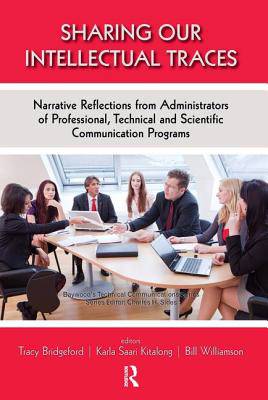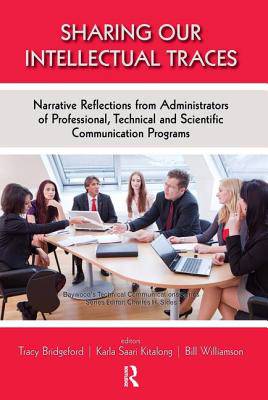
- Retrait gratuit dans votre magasin Club
- 7.000.000 titres dans notre catalogue
- Payer en toute sécurité
- Toujours un magasin près de chez vous
- Retrait gratuit dans votre magasin Club
- 7.000.0000 titres dans notre catalogue
- Payer en toute sécurité
- Toujours un magasin près de chez vous
Sharing Our Intellectual Traces
Narrative Reflections from Administrators of Professional, Technical, and Scientific Programs
Tracy Bridgeford, Karla Saari Kitalong, Bill WilliamsonDescription
Administrators of academic professional and technical communication (PTSC) programs have long relied upon lore--stories of what works--to understand and communicate about the work of program administration. Stories are interesting, telling, engaging, and necessary. But a discipline focused primarily on stories, especially the ephemeral stories narrated at conferences and deliberated at department meetings, usually suffice primarily to solve immediate problems and address day-to-day concerns and activities. This edited collection captures some of those stories and layers them with theoretical perspectives and reflection, to enhance their usefulness to the PTSC program administration community at large.
Like the ephemeral stories PTSC program administrators are accustomed to, the stories told in this volume are set within specific institutional contexts that reflect specific institutional challenges. They emphasize the intellectual traces--the debts the authors owe to those who have informed and transformed their administrative work. In so doing, this collection creates another conversation--albeit a robust, diverse, and theoretically informed one--around which program leaders might define or redefine their roles and re-envision their administrative work as the rich, complex, intellectual engagement that we find it to be. This volume asks authors to move beyond a notion of administration as an activity based solely in institutional details and processes. In so doing, they emphasize theory as they share their reflections on core administrative processes and significant moments in the histories of their associated programs, thereby affording opportunities for critical examination in conjunction with practical advice.Spécifications
Parties prenantes
- Auteur(s) :
- Editeur:
Contenu
- Nombre de pages :
- 220
- Langue:
- Anglais
- Collection :
Caractéristiques
- EAN:
- 9780895038692
- Date de parution :
- 30-04-14
- Format:
- Livre relié
- Format numérique:
- Genaaid
- Dimensions :
- 152 mm x 229 mm
- Poids :
- 497 g

Les avis
Nous publions uniquement les avis qui respectent les conditions requises. Consultez nos conditions pour les avis.






